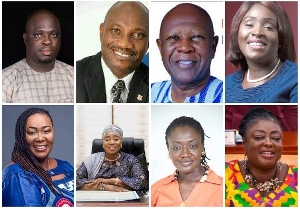 Some NPP MPs who were sacked by Akufo-Addo
Some NPP MPs who were sacked by Akufo-Addo
On Valentine's Day cum Ash Wednesday, President Akufo-Addo announced a comprehensive reshuffle of his ministers and deputy ministers, marking what has been described as his most significant ministerial shake-up to date.
A total of 13 ministers and 13 deputy ministers have been affected, with five ministers and one deputy minister being reassigned, and the remainder losing their positions in government. Some of those who have lost their positions either lost their bid in parliamentary primaries or voluntarily decided not to return to parliament.
Among those who have voluntarily decided not to return to Parliament are Dan Botwe (Okere), Kwasi Amoako-Attah (Atiwa West), Benito Owusu-Bio (Atwima Nwabiagya North), Dr Kwaku Afriyie (Sefwi Wiawso), and William Owuraku Aidoo (Afigya Kwabre South).
Those who are leaving government following their parliamentary primary defeat include Ama Pomaa Boateng (Juaben), Bright Wireko-Brobby (Lower Hemang Denkyira), Collins Ntim (Offinso North), Freda Prempeh (Tano North), Gifty Twum-Ampofo (Abuakwa North), Lariba Zuweira Abudu (Walewale), Moses Anim (Trobu), and Tina Mensah (Weija-Gbawe).
Among the new Ministers and Deputy Ministers who have been introduced or reassigned are those who won their parliamentary nomination on the party’s ticket.
These include Kojo Oppong Nkrumah, Ambrose Dery, Andrew Egyapa Mercer, Lydia Seyram Alhassan, Sylvester Tetteh, Adelaide Ntim, Akwasi Konadu, Benjamin Sekyere Yeboah, Bernard Okoe Boye and Charles Acheampong.
Female sacked appointees:
It is noteworthy to mention that the current ministerial reshuffle has resulted in five female ministers leaving their positions and five others joining as new hands or being reassigned.
However, it is important to emphasise that we now have four new female substantive ministers, namely Ophelia Mensah-Hayford (Environment, Science, Technology, and Innovation), Fatimatu Abubakar (Information), Dakoa Newman (Gender, Children and Social Protection), and Lydia Seyram Alhassan (Sanitation and Water Resources), and one new deputy minister, Adelaide Ntim (Health).
This stands in contrast to the previous composition of one substantive female minister, Freda Prempeh (Sanitation and Water Resources), and four deputy ministers; Fatimatu Abubakar (Information), Ama Pomaa Boateng (Communications and Digitalisation), Tina Mensah (Health), and Gifty Twum- Ampofo (Education).
The President had been under pressure to sack the Minister of Finance, Ken Ofori-Atta but the President has given him time to complete the International Monetary Fund (IMF) negotiations for Ghana to receive the IMF financial bailout. Despite completing the negotiations long ago, the President waited until now to sack him.
Additionally, Mr. Agyemang-Manu, the Minister of Health, was asked to resign when he admitted to making an "error" in signing the contract to procure the supply of 3.4 million doses of Sputnik-V at $19 per dose.
Strategy:
It is unclear whether this reshuffle is a public policy strategy to ensure governance efficiency or a political strategy to maximise electoral outcomes favourable to the government.
Recently, the New Patriotic Party (NPP) General Secretary, Justin Frimpong Kodua, called on the President to reshuffle ministers to facilitate the party's goal of "breaking the eight" during the party's Annual Thanksgiving Service.
Could that be the reason for the current reshuffle? Seeing how those who lost the party’s primaries have been axed and bringing on board those who would be contesting the upcoming elections on the party’s ticket, it is fair to state that the reshuffle is a campaign strategy.
The recent reshuffle of the Ghanaian government saw the appointment of 28 new ministers and deputy ministers to replace 26, resulting in a net increase of two. Given the current economic conditions of the country, it was expected that the government would reduce its size rather than expand it.
The Vice-President, Dr. Mahamudu Bawumia who is also the NPP’s presidential candidate, recently indicated that if elected, he would govern with not more than 50 ministers and deputy ministers. The President's decision not to reduce the size of the government does not suggest support for the Vice-President’s promise to reduce the size of the government when elected.
It is too early to draw meaningful conclusions about the reshuffle, as the full list of Ministers and Deputy Ministers is not yet available to the public.
However, it is worth noting that some individuals who lost their positions in government due to the reshuffle were those who lost their parliamentary primaries and those who voluntarily decided not to return to Parliament. Those who were retained or introduced won their parliamentary primaries.
Finally, the reshuffle saw the ejection from office of two key ministers whom the public had been calling on the President to remove. It remains to be seen how the new appointments will impact the government's performance over the next 10 months.
Meanwhile, Mr. Kodua claims that the President's decision to reshuffle his ministers 10 months before the general election will serve a useful purpose of producing positive results.
It remains to be seen whether that useful purpose is a strategy to promote government efficiency or is to promote NPP’s agenda to win the election in December 2024 or both.